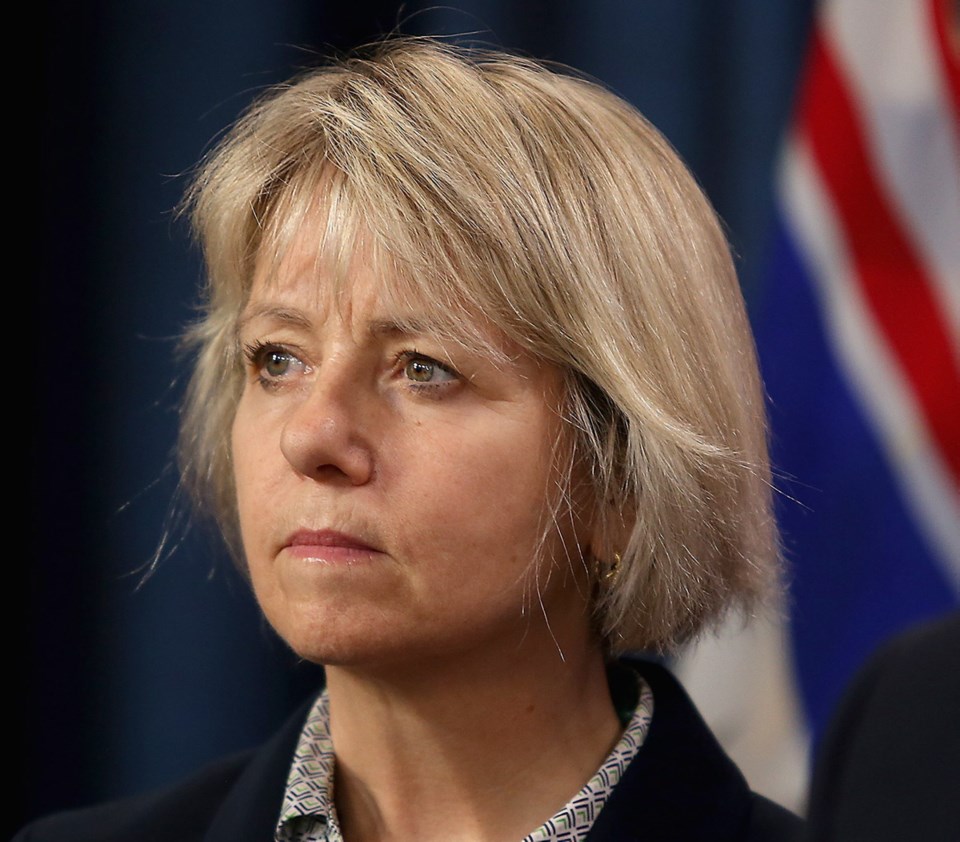B.C.’s top health officials are advising against all non-essential travel outside Canada and asking that all gatherings of more than 250 people be cancelled because of the COVID-19 pandemic.
“We are advising British Columbians against all non-essential travel outside Canada and that includes the United States,” Dr. Bonnie Henry, provincial health officer, said in her daily briefing at the legislature.
At this time, the United States poses the greatest threat of transmission to British Columbians based on the number of community transmissions there, and the frequency of travel between the two countries, she said. “Right now one of our biggest risks is the United States. Not because it’s out of control there but because we have so many people going back and forth. ... What became apparent to me over the last 24 hours is the extent of the community spread in many, many, many communities in the U.S.”
B.C. Health Minister Adrian Dix doubled down on travel restrictions outside Canada.
“That means no quarts of milk in Bellingham, no trips to Disneyland, to Paris or Berlin or Boise,” said Dix. “And anyone who chooses to travel outside Canada must stay away from work or school for 14 days upon their return. That’s a responsibility we owe to our fellow citizens.”
“The situation is just too risky right now,” said Henry. “For those people who feel that that is a risk they are willing to take, that is their decision but we need to be able to ensure that our schools and their workplaces remain safe.”
Seven new cases of COVID-19 in B.C. were announced Thursday for a total of 53. There is one presumptive case in the Island Health region, a man in his 60s who travelled to Egypt. One person has died, six have recovered, and one person is in hospital. Most transmissions involve travel to other countries.
Among the new cases is a man in his 90s at Hollyburn House care home in West Vancouver and two care workers who work there. The other four new cases are in the Vancouver Coastal Health area.
The focus on public health remains on trying to slow down the rate of transmission.
“We are also directing all event organizers in British Columbia to cancel any gathering larger than 250,” said Henry.
That 250 cap includes religious groups and places of worship, said Henry.
She encouraged religious leaders to give followers permission to worship and practise their faith outside a specific building.
The figure 250 is not an altogether scientific number, said Henry, “but it is a number we think has some rationale to it.”
Over 250 people, it becomes hard to put in social distancing measures of staying at least a metre from one another to prevent transmission of respiratory infections and clean one’s hands regularly, said Henry.
Dix said the province thinks 250 “is the right number and the right judgment amongst the choices we could have made to ensure people can engage in appropriate social distances.”
The restrictions are not forever, they are just for now, said Henry, suggesting they could last weeks but maybe months in the effort to slow and stop the spread of the virus to vulnerable people.
There is no request to close schools, Henry said. It appears that children are not being infected at the same rate as adults. Also, public health officials must consider the economic and social impacts that come with closing schools — single parents unable to find daycare, students reliant on school meal programs, and struggling students who would not be able to catch up academically after a lengthy closing.
“We don’t believe it’s appropriate at the moment to close schools,” said Henry. No school that has closed to date has done so on the advice of public health officials.
On the Island, Glenlyon-Norfolk School announced that it was starting spring break early, shutting its two campuses on Tuesday because someone connected to the school was being tested for COVID-19. On Thursday, St. Michaels University said it would close at the end of the school day on Friday, starting its spring break a week early.
March break, set for March 16 to 27 for many schools, will give health officials room to investigate further the issues around schools and what is the best action in the weeks to come, Henry said.
Various models projecting the portion of a population that could be infected with COVID-19 vary from 30 per cent to 70 per cent, said Henry.
The 30-70 per cent projection is what “everyone is stuck with given what happened in China,” said Henry referring to modelling based on the transmission rate that occurred after the outbreak in Wuhan, China.
Most people infected experience only mild symptoms, similar to a cold or flu. It’s the elderly or people with underlying health conditions who are the most vulnerable and face the greatest risk.
If 70 per cent of a population were to be infected and 15 per cent need some medical care and three to five per cent need hospitalization, that’s still “an awful lot of people,” said Henry.
Health officials still want anyone who believes they have COVID-19 to call their health provider or phone 811 to be assessed on the need for testing.
Henry said health officials here still believe they can track down transmission chains and break them.
On Thursday, the 811 line was overwhelmed with calls. The line received 3,795 calls in one day this week. More resources are being added to the health-information service, which is staffed by nurses.



